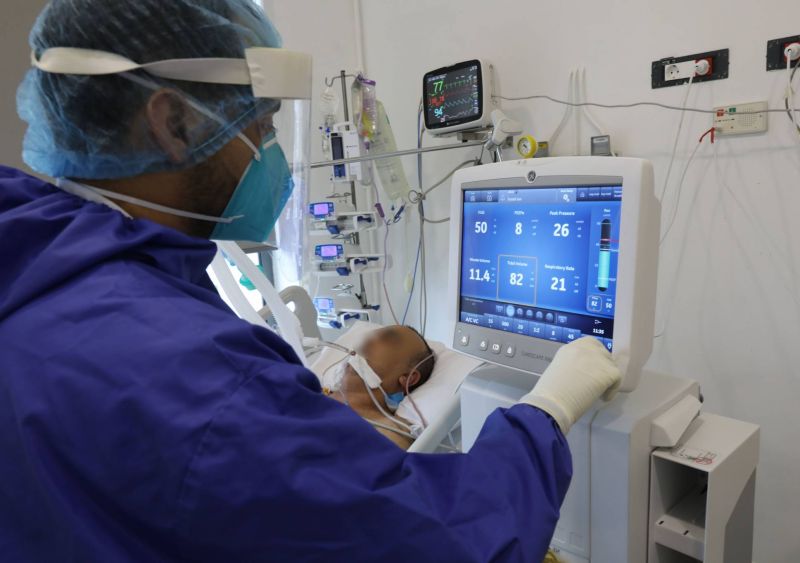
A patient receives treatment for COVID-19 at Lebanese Hospital Geitaoui in Beirut. (Credit: Anwar Amro/AFP)
BEIRUT — Hospitals in and around Beirut are at risk of cracking under the strain of an unprecedented surge in coronavirus infections that has pushed them to maximum ICU capacity, with COVID-19 patients now overflowing into emergency rooms.
The latest wave of infections, which spiraled out of control after authorities loosened restrictions over the holiday season, has seen at least 11,994 people contract the virus and another 85 die since the introduction of a strict lockdown on Thursday.
“When cases were hovering around 300, 400 and even 500 per day, we had the capacity to absorb them,” said Antoine Zoghbi, the head of the emergency department at Hôtel-Dieu de France hospital in Beirut.
But with authorities struggling to get a grip on the winter wave of infections, emergency rooms across Beirut have been turned into ad hoc coronavirus wards.
“There are around 20 COVID-19 patients in the ER, 12 of whom are in serious condition,” Zoghbi told L’Orient Today, adding that 60 regular coronavirus beds and 14 ICU beds are currently occupied.
“Such a big concentration of patients needs a lot of focus, awareness and specific supplies and equipment to avoid cross-contamination,” he said. “That’s why staff, doctors and nurses are also getting infected,” he added.
Some seven kilometers away at Bellevue Medical Center in Mansourieh, the situation is just as dire after the hospital ran out of ventilators.
“We have a total of 14 ventilators, which are all in use,” ER doctor Samer Saade told L’Orient Today, with staff scrambling to convert four other ventilators from the pediatrics department to fit adult patients.
In the ER where he works, 11 patients are being treated for coronavirus, with two intubated, while waiting to be transferred to the ICU when room becomes available.
“The hospital is trying to secure more ventilators to avoid having to make the unimaginable decision of who gets a ventilator and who doesn’t,” Saade said.
The surge has taken its toll on doctors across Lebanon, who’ve been thrust to the forefront of a pandemic accentuated by a financial crisis that has caused supplies to run low.
“Psychologically, it’s hard, being consistently exposed to the virus and having to ration supplies,” he said.
To make matters worse, doctors, nurses and administrators have been forced to urge families to tend to their loved ones at home as hospitals struggle to keep up with the pandemic’s furious pace.
“If there’s no room in the ER, we’re forced to shut the door; it’s become that bad,” Bernadette Achy, the nursing supervisor at Rizk Hospital in Beirut, told L’Orient Today.
“All ICU and regular beds are in use, and 10 coronavirus patients are in the ER, with four of them on ventilators,” she said.
In a bid to avert the hospital being overwhelmed, staff raced to set up makeshift coronavirus wards earlier Saturday, only to be momentarily stopped by the Internal Security Forces for lack of a permit.
“While we’re rushing to add bed capacity to treat patients as both our COVID-19 floors are full, a neighbor complained to the ISF because of works during a lockdown,” said Mariana Helou, the ER chief at Rizk Hospital.
The ISF denied that it had stopped any work.
With hospitals stretched to the limit and spare bed capacity at zero, doctors and nurses are at an increased risk of contracting the virus while they improvise to treat patients.
At least 14 health care workers have been infected since the strict lockdown began, according to figures from the Health Ministry.
The lack of negative pressure rooms, which prevent potentially contaminated air or other dangerous particles from flowing out, has put staff in an extremely tough spot.
“We’ve resorted to treating patients in tents outside and have a waiting list of 20 patients who are looking for a bed,” Achy said.
Mohammad Khodrin, a doctor at Abdullah Al Rassi Governmental Hospital in Halba, Akkar, said the facility is expanding its ICU capacity from 12 to 16 beds by next week.
“All ICU beds are occupied at the moment, so we’re always in contact with the Health Ministry to coordinate where patients can be transferred,” he said, but added that regular COVID-19 beds are less than half full.
Three days into the countrywide lockdown shuttering almost all public and private institutions while barring vehicular traffic except for “emergencies,” the Internal Security Forces claimed Saturday that it had handed out 2,005 fines for violations.
On social media, a number of users expressed frustration after the website to request an hourlong exemption to leave the house crashed. As of Saturday evening, it was back up.